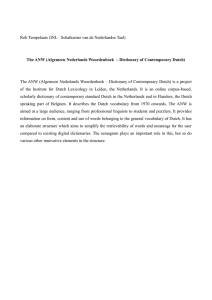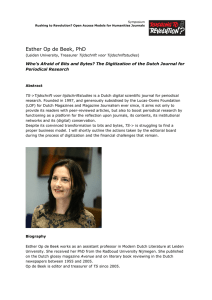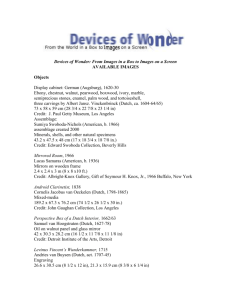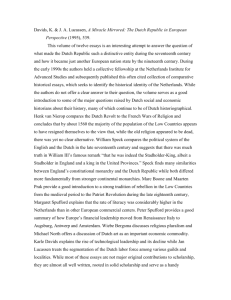Influence of the language in which a test is presented
advertisement
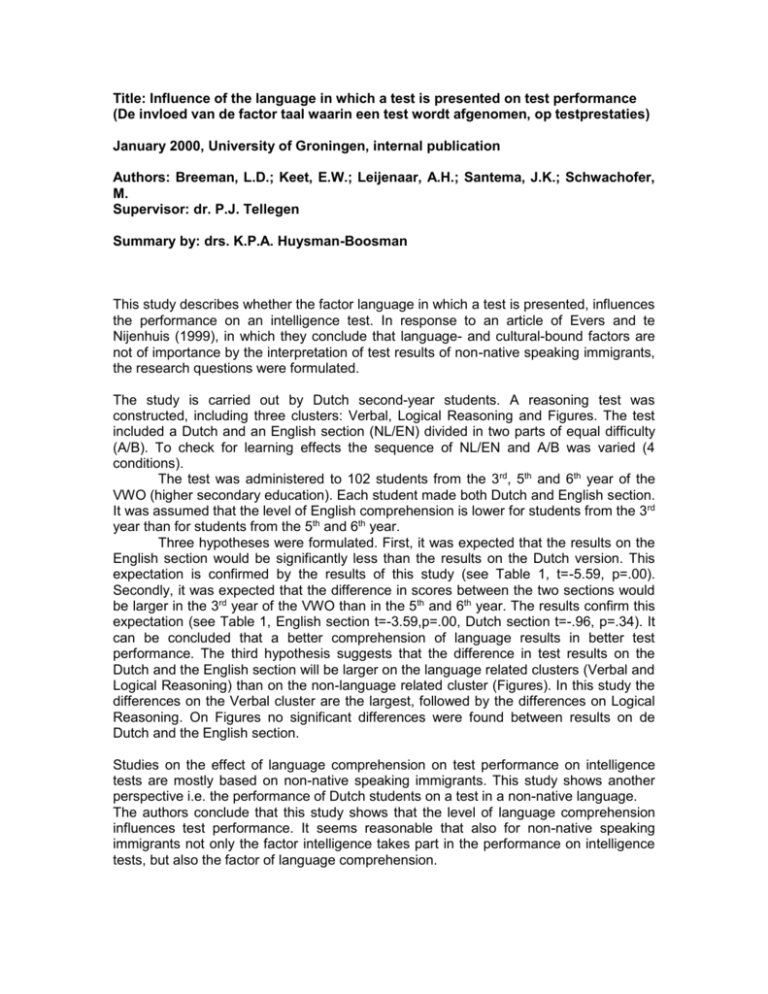
Title: Influence of the language in which a test is presented on test performance (De invloed van de factor taal waarin een test wordt afgenomen, op testprestaties) January 2000, University of Groningen, internal publication Authors: Breeman, L.D.; Keet, E.W.; Leijenaar, A.H.; Santema, J.K.; Schwachofer, M. Supervisor: dr. P.J. Tellegen Summary by: drs. K.P.A. Huysman-Boosman This study describes whether the factor language in which a test is presented, influences the performance on an intelligence test. In response to an article of Evers and te Nijenhuis (1999), in which they conclude that language- and cultural-bound factors are not of importance by the interpretation of test results of non-native speaking immigrants, the research questions were formulated. The study is carried out by Dutch second-year students. A reasoning test was constructed, including three clusters: Verbal, Logical Reasoning and Figures. The test included a Dutch and an English section (NL/EN) divided in two parts of equal difficulty (A/B). To check for learning effects the sequence of NL/EN and A/B was varied (4 conditions). The test was administered to 102 students from the 3rd, 5th and 6th year of the VWO (higher secondary education). Each student made both Dutch and English section. It was assumed that the level of English comprehension is lower for students from the 3rd year than for students from the 5th and 6th year. Three hypotheses were formulated. First, it was expected that the results on the English section would be significantly less than the results on the Dutch version. This expectation is confirmed by the results of this study (see Table 1, t=-5.59, p=.00). Secondly, it was expected that the difference in scores between the two sections would be larger in the 3rd year of the VWO than in the 5th and 6th year. The results confirm this expectation (see Table 1, English section t=-3.59,p=.00, Dutch section t=-.96, p=.34). It can be concluded that a better comprehension of language results in better test performance. The third hypothesis suggests that the difference in test results on the Dutch and the English section will be larger on the language related clusters (Verbal and Logical Reasoning) than on the non-language related cluster (Figures). In this study the differences on the Verbal cluster are the largest, followed by the differences on Logical Reasoning. On Figures no significant differences were found between results on de Dutch and the English section. Studies on the effect of language comprehension on test performance on intelligence tests are mostly based on non-native speaking immigrants. This study shows another perspective i.e. the performance of Dutch students on a test in a non-native language. The authors conclude that this study shows that the level of language comprehension influences test performance. It seems reasonable that also for non-native speaking immigrants not only the factor intelligence takes part in the performance on intelligence tests, but also the factor of language comprehension. Table 1. Total score on English and Dutch questions, divided by year N Mean St. Dev. English 3-VWO 5/6-VWO total 66 36 102 11.58 13.50 12.25 2.72 2.34 2.74 Dutch 3-VWO 5/6-VWO total 66 36 102 13.58 14.28 14.00 2.04 2.37 2.16 References Evers, A. & te Nijenhuis, E. (1999). Liever speciale dan traditionele cognitieve capaciteitentests voor allochtonen? Een vergelijking. De Psycholoog, 34, 250-255.




